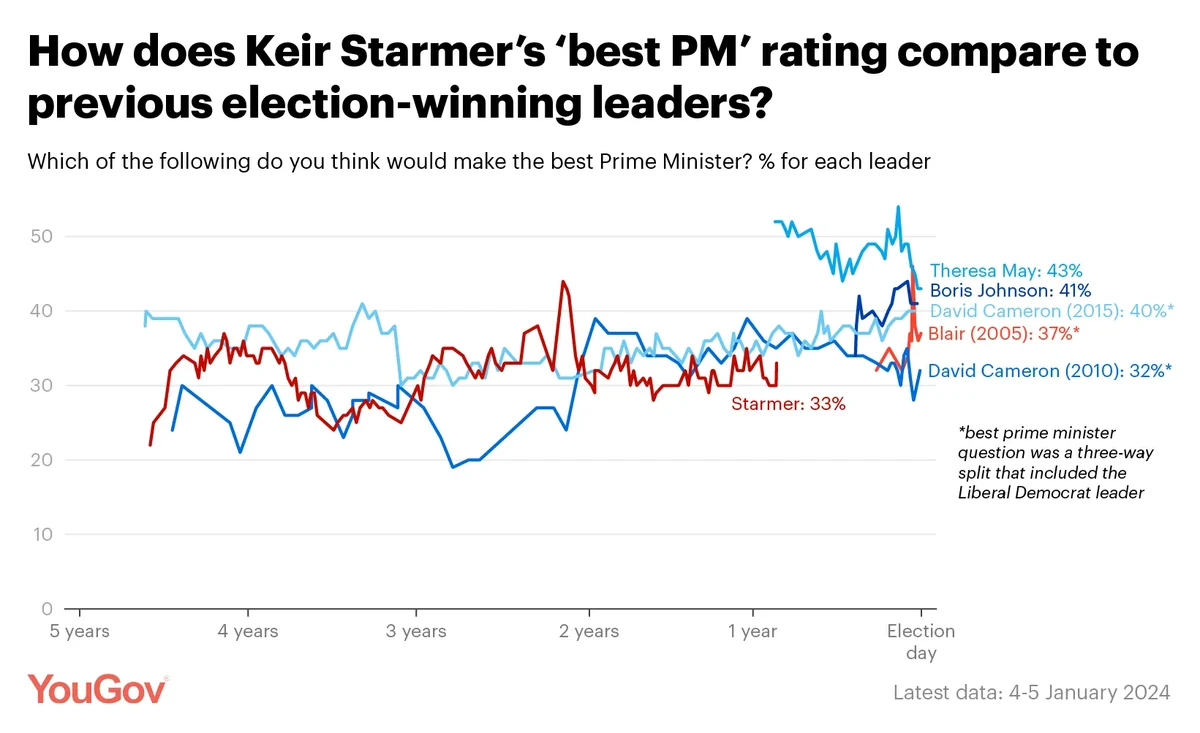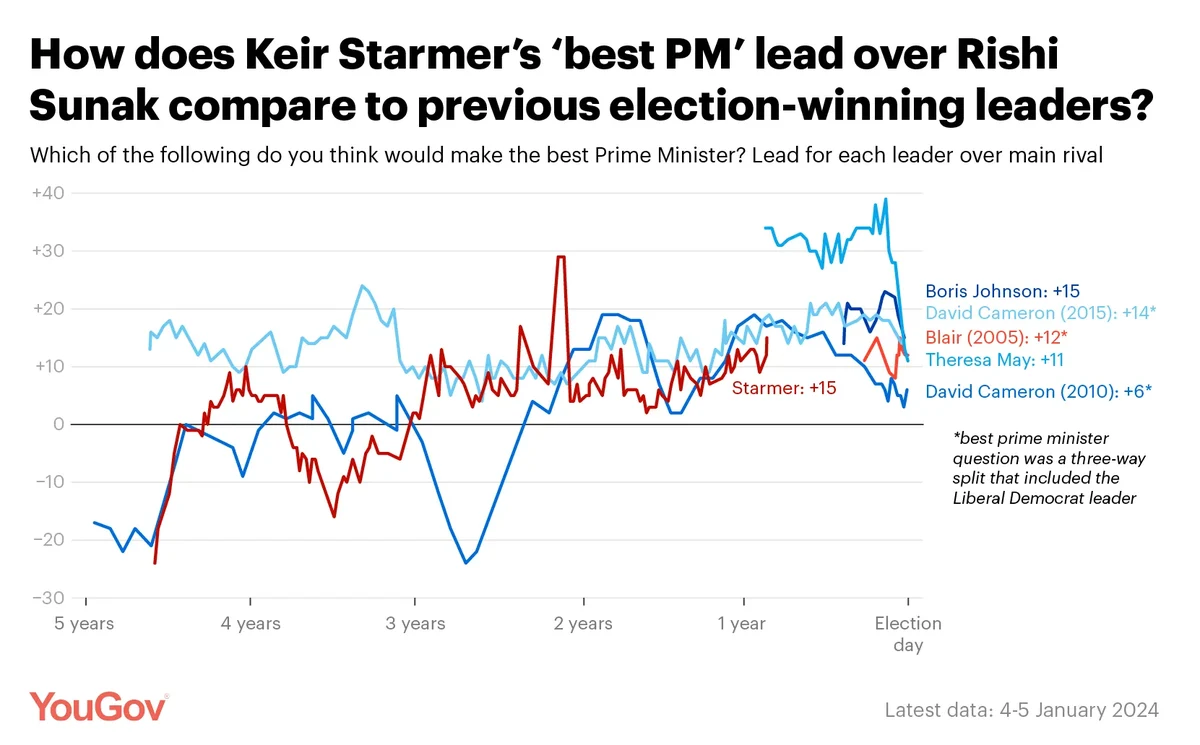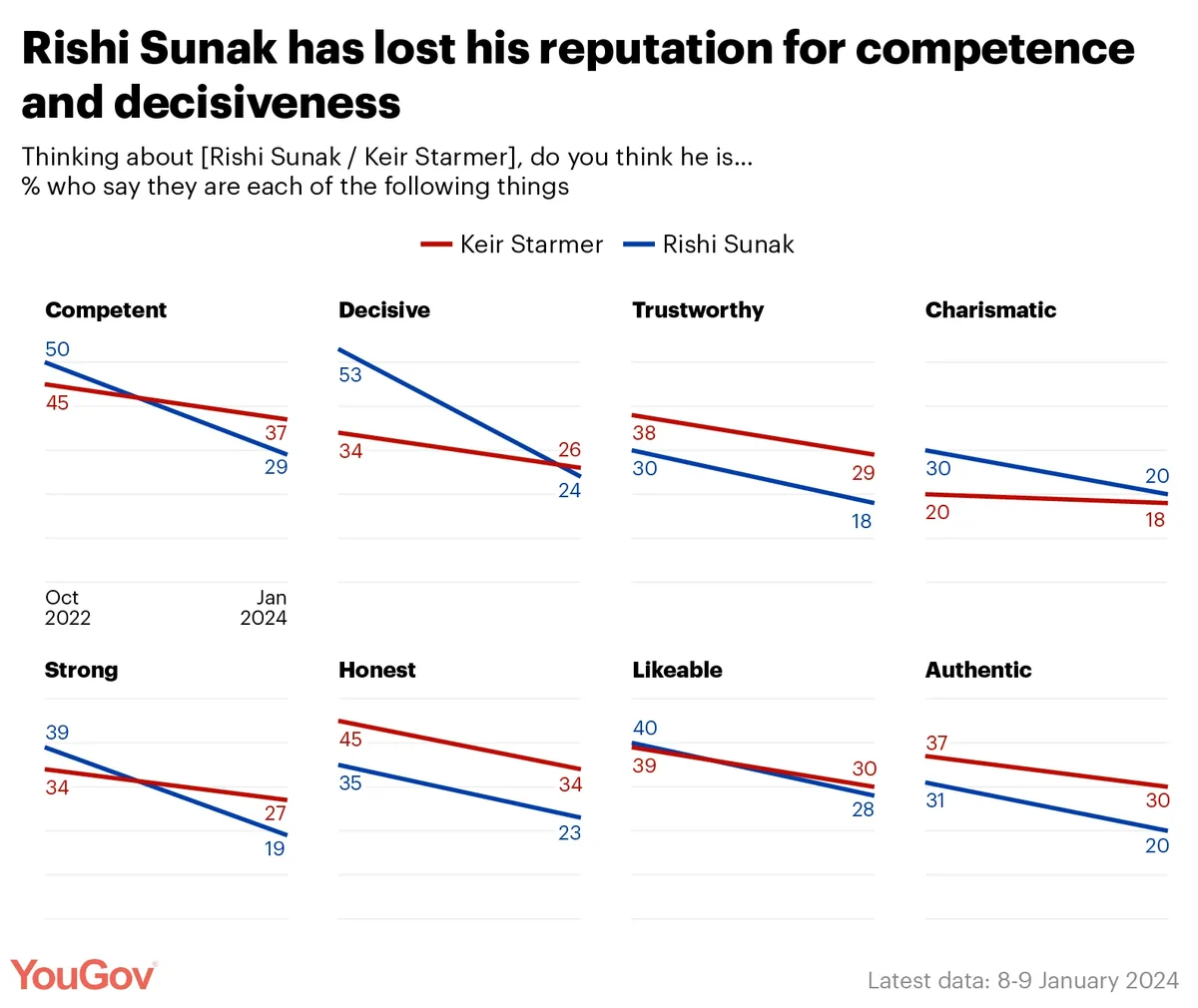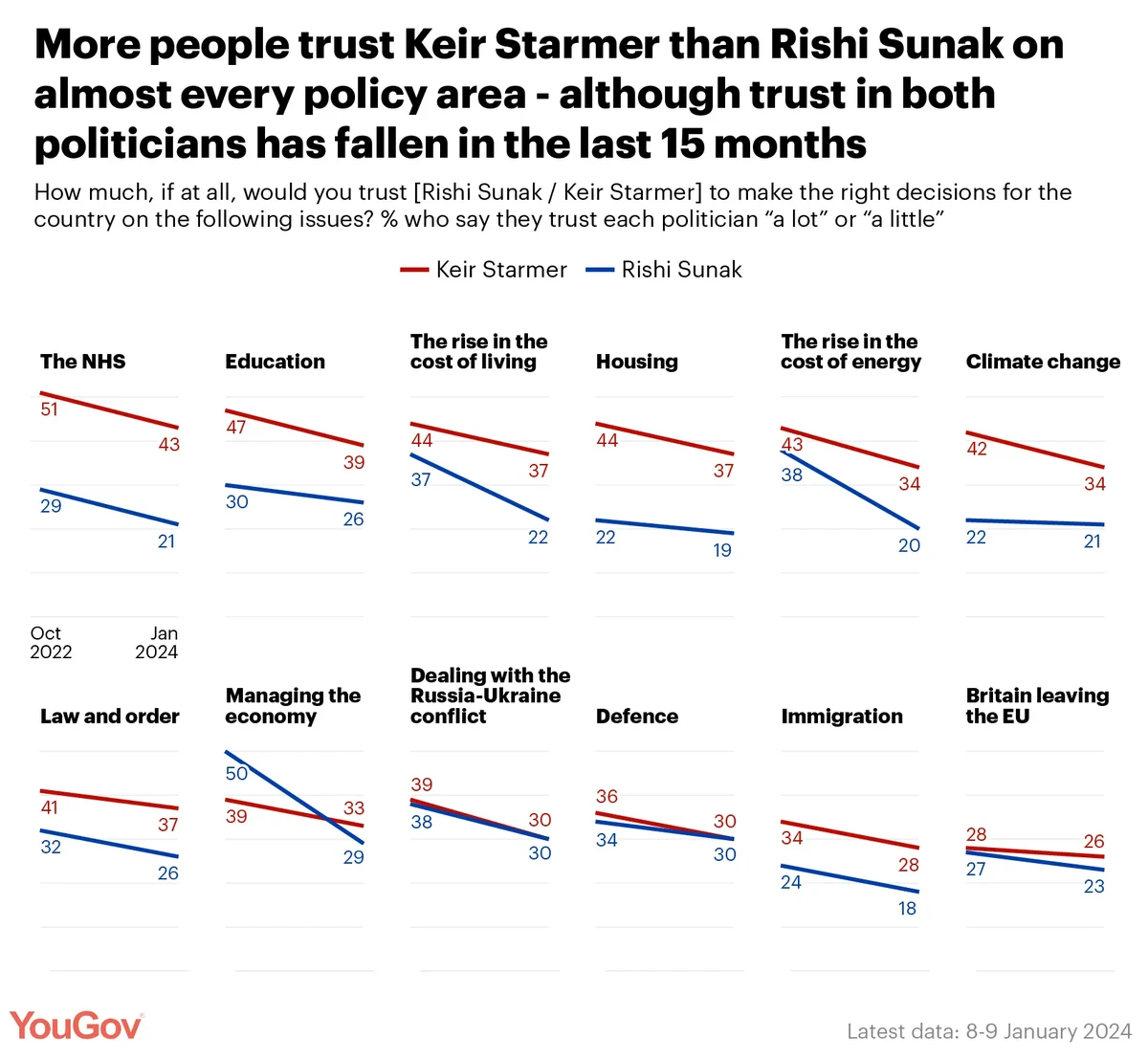The Conservative leader has lost his reputation for competence and decisiveness since 2022
As we enter the year of the election, Labour hold a commanding lead over the Conservatives in the voting intention rivals. One of the key factors that will help Britons decide who to vote for is whether they want Rishi Sunak or Keir Starmer to be prime minister.
When Rishi Sunak first took office in October 2022, we looked at how the new prime minister compared against his Labour challenger in the eyes of the public. Now, 15 months later, we return to those same questions.
The results show that both party leaders have seen their reputations diminish in the eyes of the public, but Sunak’s to the greater extent. While neither’s scores are stellar, Keir Starmer holds a clear advantage in the coming electoral contest.
Who do Britons think would make the better prime minister?
Rishi Sunak trails Keir Starmer by 15 points on who Britons think would make the best prime minister, at 33% for the Labour leader to his Tory counterpart's 18%.
Even among those who backed the Conservatives in 2019, just 41% say they think Sunak would make the best prime minister – when he first took office that figure had been 61%.
By contrast, 66% of 2019 Labour voters think Keir Starmer is the better man for the job – as do 10% of Tory voters.
However, Starmer’s lead is largely down to the demise in Sunak support. The Labour leader’s score is largely unchanged from what it was when the current prime minister took office (34%), whereas Sunak’s has since dropped 12 points (from 30%).
Looking back over recent electoral history, Starmer’s ‘best PM’ score is trailing that of most other leaders who have gone on to win elections. In the closest YouGov poll to voting day, Boris Johnson scored 41%, Theresa May 43%, David Cameron in 2015 scored 40% on this question, and farther back Tony Blair scored 37% in 2005.

Starmer’s score is most similar to David Cameron’s pre-2010 result of 32% – although note that for the 2005, 2010 and 2015 elections this question was asked as a three-way split between the Labour, Conservative and Lib Dem leaders, which pushes the Labour and Conservative leaders’ scores down slightly compared to the current Labour vs Conservative only format of the question.
If we look back to the same point in the electoral cycle (assuming a 2024 election in mid-November, as per media speculation), then Starmer slightly trails David Cameron’s scores prior to the 2010 and 2015 elections (35% and 38%, respectively) and is a long way behind Theresa May’s 52%. (Boris Johnson wasn't in power long enough prior to the 2019 election to provide a comparison this far out, and YouGov polling on the question in 2005 likewise began too close to the election to compare for Tony Blair).
While Starmer’s current score may be on the low side, his lead over his rival is in line with that of previous election winners in final polling before the election. His 15-point advantage over Sunak matches that which Boris Johnson held over Jeremy Corbyn in the final poll before the 2019 general election, and is similar to May’s 11-point lead over Corbyn in 2017, Cameron’s 14-point lead over Miliband in 2015, and Blair’s 12-point lead over Howard in 2005.

Only David Cameron in 2010 held a narrower lead, at six points – although this is partly because of the inclusion of Nick Clegg in the question, not least after ‘Cleggmania’.
Compared to this point in the electoral timeline, Starmer’s 15-point lead is comparable to David Cameron’s 17-point lead ahead of the 2010 election, and slightly behind his 19-point lead ahead of the 2015 election. Theresa May, by contrast, held a 34-point lead over Corbyn.
How do Britons view Rishi Sunak and Keir Starmer on a personal level?
When it comes to their personal character, neither Rishi Sunak nor Keir Starmer score very highly, and both have seen their scores across all characteristics diminish in the previous 15 months.
Rishi Sunak’s pitch during his leadership campaign was centred on his personal competence. Since he has taken office, however, the prime minister has lost his reputation as a capable administrator: just 29% of Britons now consider Rishi Sunak to be competent, down from 50% in October 2022. By contrast, almost half (48%) of the public see him as incompetent, an increase of 26 points.
The prime minister likewise previously had a strong reputation for decisiveness, with 53% considering him decisive in 2022. That figure has since plummeted to 24%.
While Keir Starmer’s competence rating is now higher than Sunak’s, at 37%, this too has diminished over the same time period, by eight points. When it comes to decisiveness, his own score now largely matches the prime minister’s, at 26%.

Sunak likewise trails his Labour rival on other key characteristics like trustworthiness (18% to Starmer’s 29%) and strength (19% to 27%).
When it comes to relatability, 78% of the public (including 70% of 2019 Conservative voters) think that Rishi Sunak is out of touch with ordinary people. Only 9% of Britons think that the prime minister is in touch with ordinary people.
Keir Starmer is generally also viewed as out of touch, but this is by a much smaller margin (41% out of touch to 32% in touch). However, a majority of 2019 Labour (55%) do view Starmer as in touch with ordinary people.
How many Britons trust Rishi Sunak and Keir Starmer on various policy areas?
More people trust Keir Starmer than Rishi Sunak to manage nearly every issue we asked about. However, trust in both party leaders has fallen since the previous survey 15 months ago.
Ex-chancellor Sunak was particularly trusted with the economy (50%) when he took office in 2022, but only 29% of Britons still feel the same way.
More Britons trust Starmer (33%) to manage the economy, although trust in the Labour leader to make the right economic decisions has also dropped, by a lesser rate of six points since October 2022.
On the cost of living more specifically, Starmer’s lead over Sunak is greater still, with 37% trusting the Labour leader compared to 22% for his Conservative counterpart.

The biggest gap between the two politicians is on the NHS, with the public twice as likely to trust Starmer (43%) as they are Sunak (21%).
And with the Conservatives trying to draw attention to asylum seekers as a top political issue, it will also come as a disappointment that Keir Starmer is trusted more to manage the country’s immigration process by 28% to 18%.
The only areas in which Keir Starmer does not have a lead over his Tory rival are defence-related: on both the broad issue of defence, and the more specific issue of the Russia-Ukraine war, the two candidates are tied 30% to 30%.
See the full results here and here
Photo: Getty






